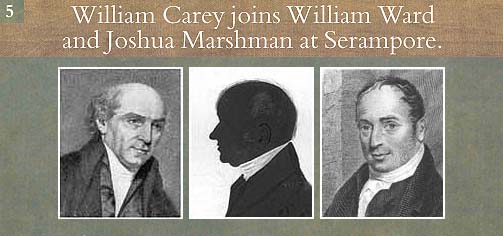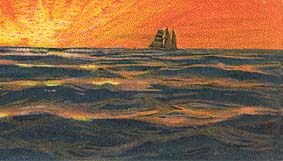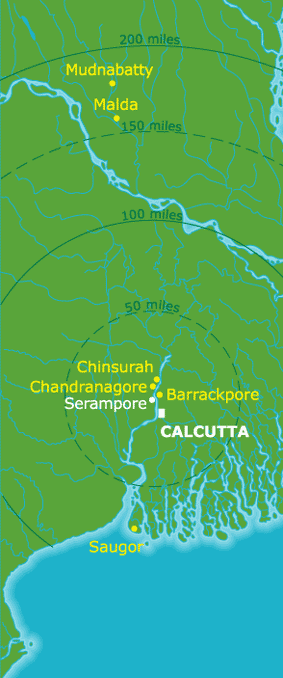

Rev. William Carey, Rev Joshua Marshman and Rev. William Ward. Portrait of Carey, courtesy Serampore College; portraits of Marshman and Ward, courtesy Derby Local Studies Library. The voyage on the 'Criterion' Embarking on a Company ship was out of the question and all the Danish East Indiamen of the season had already sailed, so it was fortunate that an American vessel, the 'Criterion'. was on the eve of sailing. A passage was immediately booked for the whole party. The 'Criterion' was commanded by Captain Wickes, a Presbyterian from Providence, Rhode Island, who wrote to Andrew Fuller saying 'he had long cherished the hope of being privileged to convey the messengers of the Gospel to the heathen, and his fondest wish was about to be gratified'.
On the 24th May, 1799, Ward embarked on the 'Criterion'. On the 27th he set sail from Gravesend with his colleagues Mr. Grant, Mr Brunsdon and Mr Marshman; together with their families.
The captain gave them every opportunity of speaking to and instructing the crew. Sabbath services were held on deck and during the week, morning and evening devotions continued, in which the captain joined. In a letter Ward writes:
'This evening we had a precious hour at prayer. Captain Wickes read from the twelfth verse of the thirty-third chapter of Exodus, and then joined in prayer. Our hearts were all warmed. We shook hands with our dear captain, and could have clasped him to our bosoms. With what affection did he pray for us - for our missionary success - for everything we could wish in our circumstances. The chapter was selected by himself, and was peculiarly applicable.'

The journey took four and half months and, as they approached India, anxiety was expressed about the treatment they would receive from a hostile government. The lack of a license depressed their spirits. Mr. Grant had advised them not to land at Calcutta but to go on to Serampore which was under the Danish flag, and there wait for an opportunity to proceed to Mudnabatty to join Carey. They had been provided with a letter of introduction from the Danish Consul in London to the governor of the settlement.
At the entrance to the Hooghly, at Sagor Roads, a pilot came aboard and presented the Captain with the forms to declare the names of the passengers, their occupation and destination. After some discussion it was decided to declare openly their occupation and their destination. They were entered as Christian missionaries proceeding to Serampore.
On Sunday morning, 13th October, 1799, they found themselves outside the neat little hotel at Serampore.
Serampore lies on the west bank of the Hooghly, 17 miles north of Calcutta and opposite Barrackpore, the country seat of the Governor-General, with its well-wooded park and its five or six native regiments who were usually stationed there. Serampore had been founded in 1755 and its 20 acres were the base for Danish trade and were Danish sovereign territory. It was at the zenith of its prosperity which was due to the proximity of Calcutta, where employees of the East India Company, for financial reasons, often used it to transport their wealth back to England.
On 14th October, the missionaries visited Colonel Bie, the Governor, and were received with 'cordial affability'.
Against his advice, they proceeded to arrange boats for the passage up river to Mundnabatty, but had to quickly cancel them as Captain Wickes had returned with news that their arrival had been immediately noted by the British authorities and he was instructed that they should immediately leave the country. Colonel Bie had offered them his protection and, even though he had only a saluting battery against the might of the British, he was not to be bullied. The Governor-General, Lord Wellesley, bowed to reality as the missionaries were beyond his reach and Captain Wickes was allowed to leave.
The policy of India House, London, was that there were to be no missionaries in their Presidency.
For the group to continue in the hotel would have eaten into their precious funds so, after four days, they hired a small house in the back part of town. Each family had just one room. A larger room was set aside for meals and for services. On the second Sunday after their arrival they invited the Christian community of the town to join them in worship. The Governor and other gentlemen brought their own chairs and Ward delivered a discourse. He writes:
'October 20th. I am this day thirty years of age. What scenes have I passed through! and now I am fifteen thousand miles away from home, preaching before the Governor of a Danish settlement!"
The house was damp and it was the rainy season. This proved fatal for one of their number. Mr. Grant went down with a cold, which became a fever, and by 31st October he was dead.
The following letter from Serampore, dated 22nd October 1799, gives some idea of the depth and fervour of Ward's feelings at this time:
'Last night I went with a native a walk in the town. In our way he took me to a hut of a Portuguese; I there found an old man of 73, stretched on his bed and calling on the name of Jesus. He spoke of his dolorous sufferings, his precious blood, &c. I did not obtain satisfaction respecting his real Christianity; but the name of Jesus on a copper coloured man here, is like the unexpected meeting of a friend. We went forward in our walk and came to a place in the open air, where the natives were assembled to worship their God, Ram, whose history is too long for me to write here. In this worship the priest stood in the midst of a number of natives, who sat on the grass. He had a kind of brush in one hand made of Buffalo's hair, and in the other two pieces of brass, which sounded like bells by the shaking of his hands. His face was painted, and he had round his neck two or three chains made of shells, &c. During very short intervals of singing by five young men standing at his back, he spoke two or three sentences to his hearers exhorting them to repeat the name of Ram, and to avoid that which was bad. Some of the natives were at work making nets, while they professed to be worshipping their God. On our return home, I saw a man making clay Gods, though he is by trade a washerman. In this settlement which contains perhaps more than 3000 inhabitants, there are not less, I suppose, than fifty houses inhabited by prostitutes, though Hindoos marry very young. I would rather be here to dedicate my life to the conversion of the Hindoos, than in any other place in the world.
After entering the Bay of Bengal, brother Brunsdon and I went on shore at a time when the ship was laying at anchor waiting for the tide. The natives accompanied us in our walk; our looks, our questions, our affability pleased them. We were not permitted to enter their pagoda, or idol temple; but in our walk we saw, on a small rising ground, three stones in a rough state laid together, with a little paint on them, and several bits of stick in the shape of dogs. I approached it to examine; the natives lifted up their hands to warn me, that I was treading on forbidden ground. I retired, when they bowed their heads to the ground towards it and said it was their God. So paltry a God I never saw before.
We are all happy and have no desire to come to England. God will provide for us, and sooner or later India shall learn the doctrine of the cross, and sing the song of Moses and the Lamb. I have no doubt of it. Their superstitions are sinking into oblivion very fast even without the torch of truth; but with a Bible and a Press, posterity will see, that a missionary will not labour in vain even in India. There is 'a time to break down, and a time to sow, and a time to reap.'
My dear friend, live near to God; this is the philosopher's stone, that turns everything into gold. I often think of you walking and praying - Yes, the hour approaches, when we shall walk together, 'High in salvation and the climes of bliss.'
On arrival in Serampore the missionaries had written to William Carey suggesting he join them at Serampore. His reply arrived on 3rd November with the discouraging news that he was unwilling to abandon his idea that they should join him at Kidderpore.
The Danish governor called on the missionaries on the 6th November, assuring them of his protection, and pressed them to make Serampore their headquarters. He suggested they open a school, and a printing works, in suitable premises, on very reasonable terms, and offered them Danish citizenship so that they could travel in the British territories whenever they wished. The Rev. Mr. Brown, from Calcutta, assured them that Lord Wellesley would not allow a printing press in the territories outside Calcutta - that included Malda which was 200 miles away. He even suggested that Lord Wellesley would be happy for any press to be established outside his jurisdiction so that as he would not need to concern himself with it, and thereby outside the influence of the East India Company.

Ward and Marshman discussed the alternatives and it was immediately decided that Ward should proceed, at once, to Malda, and persuade Carey to join them at Serampore. Using his Danish passport, Ward arrived at Carey's bungalow in Kidderpore on 1st December, 1799, and in a letter describes his first interview with the man who was to be his colleague for the next 23 years.
'This morning we left the boat, and walked a mile and a half to brother Carey's. I felt very unusual sensations as I drew near the house. So near to brother Carey, after a voyage of 15,000 miles, and a tedious journey up the river, and in our present circumstances... what an interesting situation! The sight of the house increased my perturbation. We met Hurry Churron. At length I saw Carey! He is less altered than I expected, has rather more flesh than when in England, and, blessed be God, is a young man still.'
The two men discussed the alternatives. Here, if he gave any offense at any time his license could be revoked, and it would be completely withdrawn if his missionary aims were discovered. The newly arrived missionaries would not be able to join him. At Serampore they would be free from interference from the British authorities and they could establish a press and receive more missionaries. The area around Serampore was also densely populated.
However, after 4 years struggle, Carey had purchased an indigo factory and begun buildings for his brethren. They could not be abandoned without loss.
While they were deliberating, a letter arrived from Marshman stating that leading members of the Government were exasperated at the surreptitious arrival of the missionaries and threatened to arrest any that were discovered on the Company's territories. Ward stated that 'I have a passport from the governor of Serampore, and I do not therefore fear interruption'. This letter decided the question and the decision was made to move to Serampore. They decided to purchase some land and run up some cheap buildings at a cost of £300.
Carey had with him a press, and type, that had been purchased in Calcutta. (1) They were packed up and dispatched. During the succeeding 3 weeks Ward and Carey visited Dinagepore, Malda and the mountain tribes in the Rajmahal hills.
Carey arrived at Serampore on 10th January, 1800, with his 4 sons and his wife, who was now in a state of hopeless insanity.
(1) According to Geoffrey Moorhouse in 'Calcutta', Weidenfeld and Nicholson, 1971, the press was bought in Calcutta for £40